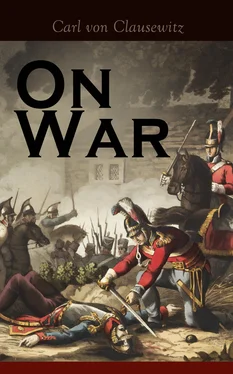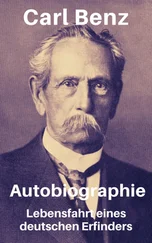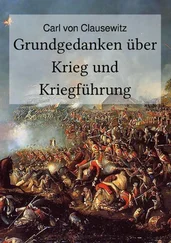These are the circumstances in general connected with the aim which we have to pursue in War; let us now turn to the means.
There is only one single means, it is the Fight . However diversified this may be in form, however widely it may differ from a rough vent of hatred and animosity in a hand-to-hand encounter, whatever number of things may introduce themselves which are not actual fighting, still it is always implied in the conception of War that all the effects manifested have their roots in the combat.
That this must always be so in the greatest diversity and complication of the reality is proved in a very simple manner. All that takes place in War takes place through armed forces, but where the forces of War, i.e. , armed men, are applied, there the idea of fighting must of necessity be at the foundation.
All, therefore, that relates to forces of War—all that is connected with their creation, maintenance, and application—belongs to military activity.
Creation and maintenance are obviously only the means, whilst application is the object.
The contest in War is not a contest of individual against individual, but an organised whole, consisting of manifold parts; in this great whole we may distinguish units of two kinds, the one determined by the subject, the other by the object. In an Army the mass of combatants ranges itself always into an order of new units, which again form members of a higher order. The combat of each of these members forms, therefore, also a more or less distinct unit. Further, the motive of the fight; therefore its object forms its unit.
Now, to each of these units which we distinguish in the contest we attach the name of combat.
If the idea of combat lies at the foundation of every application of armed power, then also the application of armed force in general is nothing more than the determining and arranging a certain number of combats.
Every activity in War, therefore, necessarily relates to the combat either directly or indirectly. The soldier is levied, clothed, armed, exercised, he sleeps, eats, drinks, and marches, all merely to fight at the right time and place .
If, therefore, all the threads of military activity terminate in the combat, we shall grasp them all when we settle the order of the combats. Only from this order and its execution proceed the effects, never directly from the conditions preceding them. Now, in the combat all the action is directed to the destruction of the enemy, or rather of his fighting powers , for this lies in the conception of combat. The destruction of the enemy’s fighting power is, therefore, always the means to attain the object of the combat.
This object may likewise be the mere destruction of the enemy’s armed force; but that is not by any means necessary, and it may be something quite different. Whenever, for instance, as we have shown, the defeat of the enemy is not the only means to attain the political object, whenever there are other objects which may be pursued as the aim in a War, then it follows of itself that such other objects may become the object of particular acts of Warfare, and therefore also the object of combats.
But even those combats which, as subordinate acts, are in the strict sense devoted to the destruction of the enemy’s fighting force need not have that destruction itself as their first object.
If we think of the manifold parts of a great armed force, of the number of circumstances which come into activity when it is employed, then it is clear that the combat of such a force must also require a manifold organisation, a subordinating of parts and formation. There may and must naturally arise for particular parts a number of objects which are not themselves the destruction of the enemy’s armed force, and which, while they certainly contribute to increase that destruction, do so only in an indirect manner. If a battalion is ordered to drive the enemy from a rising ground, or a bridge, &c., then properly the occupation of any such locality is the real object, the destruction of the enemy’s armed force which takes place only the means or secondary matter. If the enemy can be driven away merely by a demonstration, the object is attained all the same; but this hill or bridge is, in point of fact, only required as a means of increasing the gross amount of loss inflicted on the enemy’s armed force. It is the case on the field of battle, much more must it be so on the whole theatre of war, where not only one Army is opposed to another, but one State, one Nation, one whole country to another. Here the number of possible relations, and consequently possible combinations, is much greater, the diversity of measures increased, and by the gradation of objects, each subordinate to another the first means employed is further apart from the ultimate object.
It is therefore for many reasons possible that the object of a combat is not the destruction of the enemy’s force, that is, of the force immediately opposed to us, but that this only appears as a means. But in all such cases it is no longer a question of complete destruction, for the combat is here nothing else but a measure of strength—has in itself no value except only that of the present result, that is, of its decision.
But a measuring of strength may be effected in cases where the opposing sides are very unequal by a mere comparative estimate. In such cases no fighting will take place, and the weaker will immediately give way.
If the object of a combat is not always the destruction of the enemy’s forces therein engaged—and if its object can often be attained as well without the combat taking place at all, by merely making a resolve to fight, and by the circumstances to which this resolution gives rise—then that explains how a whole campaign may be carried on with great activity without the actual combat playing any notable part in it.
That this may be so military history proves by a hundred examples. How many of those cases can be justified, that is, without involving a contradiction and whether some of the celebrities who rose out of them would stand criticism, we shall leave undecided, for all we have to do with the matter is to show the possibility of such a course of events in War.
We have only one means in War—the battle; but this means, by the infinite variety of paths in which it may be applied, leads us into all the different ways which the multiplicity of objects allows of, so that we seem to have gained nothing; but that is not the case, for from this unity of means proceeds a thread which assists the study of the subject, as it runs through the whole web of military activity and holds it together.
But we have considered the destruction of the enemy’s force as one of the objects which maybe pursued in War, and left undecided what relative importance should be given to it amongst other objects. In certain cases it will depend on circumstances, and as a general question we have left its value undetermined. We are once more brought back upon it, and we shall be able to get an insight into the value which must necessarily be accorded to it.
The combat is the single activity in War; in the combat the destruction of the enemy opposed to us is the means to the end; it is so even when the combat does not actually take place, because in that case there lies at the root of the decision the supposition at all events that this destruction is to be regarded as beyond doubt. It follows, therefore, that the destruction of the enemy’s military force is the foundation-stone of all action in War, the great support of all combinations, which rest upon it like the arch on its abutments. All action, therefore, takes place on the supposition that if the solution by force of arms which lies at its foundation should be realised, it will be a favourable one. The decision by arms is, for all operations in War, great and small, what cash payment is in bill transactions. However remote from each other these relations, however seldom the realisation may take place, still it can never entirely fail to occur.
Читать дальше












